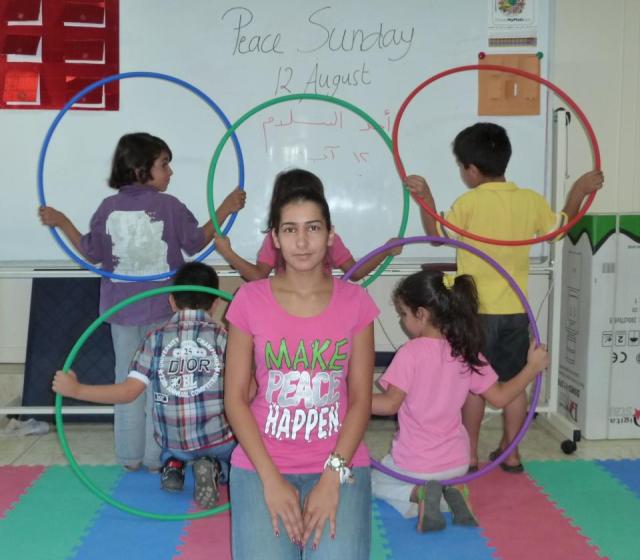Dr Filis is the Director of the International Olympic Truce Centre in Athens. Here he is interviewed on British Forces radio, including his thoughts on Syria.
Tag Archives: Syria
Lord Bates calls for 24hr ceasefire in Syria to be declared at Olympics Closing Ceremony

Young Syrian refugees in Bekka Valley make the Olympic rings and call for a 24hr truce on “Peace Sunday” 12th August.
Lord Bates, who walked the length of Europe to promote the Olympic Truce, and who has blogged recently on who is responsible for keeping the Truce, is currently on the Lebanon-Syria border.
He writes on the 12,000-strong Olympic Truce Facebook page this evening
Call for 24 hour truce in Syria during the Closing Ceremony of the Olympics on Sunday 12th August made by Syrian refugees I met in Bekka Valley today but too frightened to show their faces.
It’s time for UN, IOC and LOCOG to hear their call and act….
Local communities are often the ones at the sharp end of conflict. Join the Olympic Truce Facebook page here.
International Olympic Truce Centre – Open Forum

Everyone was given an Olympic Truce pin badge, along with an information pack. The London Peace Network was given extra badges, so if you would like one, please contact us.
Dr Filis, the Director of the International Olympic Truce Centre, invited us all to join him at the Open Forum this afternoon.
The distinguished panel included Lord Michael Bates (who spoke at our event at the Imperial War Museum), Willi Lemke (special advisor to the UN Secretary General and who spoke at our Millennium Bridge event), Hugh Dugan (US Truce Foundation) and Fani Palli Petralia (Vice-Chairperson of the International Olympic Truce Foundation).
The Truce Wall in the Athletes’ Village has filled up with signatures already – Hugh suggested another couple of panels are added, generating a news story about the Truce which might be a welcome break from reports of the medal count.
The situations in Syria and Burma were of great concern to all present and one journalist, Evdoxia Lymperi of ERT3, asked what practical impact the Truce has had this time around. The UN resolution was signed and co-sponsored by all 193 member states of the UN, yet some of the signatories show no sign of calling even a brief cease-fire during the Games.
The projects which LBFN and the London Peace Network have proposed are all (bar one) in conflict or post-conflict zones. We are very pleased that the twinned UK-Pakistan project has been approved by the Foreign Office. We hope to hear good news of twinned activites between local communities in the UK and Iran, Iraq, Ghana and Jamaica. We are working on a proposal for Sri Lanka.
On behalf of the Network, I asked how the experience and expertise of local religious and community organisations (often at the sharp end of violence both in the UK and overseas) could be used to build a stronger Olympic Truce every four years.
The response from Dr Filis and Willi Lemke was very positive and we will be taking this forward with both the IOTC and the UN.
More bells for peace | Financial Times comment
Not everyone managed to get to the Millennium Bridge last Friday at 8.12am (just as well), but word is reaching the London Peace Network that a few brave souls rang their door and other bells in solidarity.
Here is musician John Woodhouse, who convenes Westminster Cathedral Inter Faith Group and who is a regular at London Borough Faiths Network meetings. Go John!
A couple of pieces by Peter Aspden in the Financial Times have mentioned the Olympic Truce: Missing: that elusive truce (which mentions the glorious Peace Camp) and Childish fun and games (which mentions All The Bells).
The Olympic Truce has undoubtedly suffered from a rock-bottom profile (it doesn’t even get a mention in the London 2012 Official Book). Most of the peace-building activities we include here at the London Peace Network involve local community groups and are below the radar, but many of them wouldn’t be happening at all were it not for the Olympic Truce.
The International Olympic Truce Centre actively supports peace-making efforts world wide. We are hoping to meet the team while they are in London.
What do you think?
Is there a role for local communities in peace-building? Both here in the UK and overseas, they tend to be at the sharp end when it comes to violence. If so, what?
Or should we leave it to national and world leaders? Ban Ki-moon said at the Friday Olympic Truce event organised by the Foreign Office that, having visited Srebrenica (which he said was one of the most painful places for a UN Secretary General to visit), he didn’t want a future UN SG to have to visit Syria in 10 years’ time to apologise.
Are there ways to harness the experience and expertise of both? If so, how?
